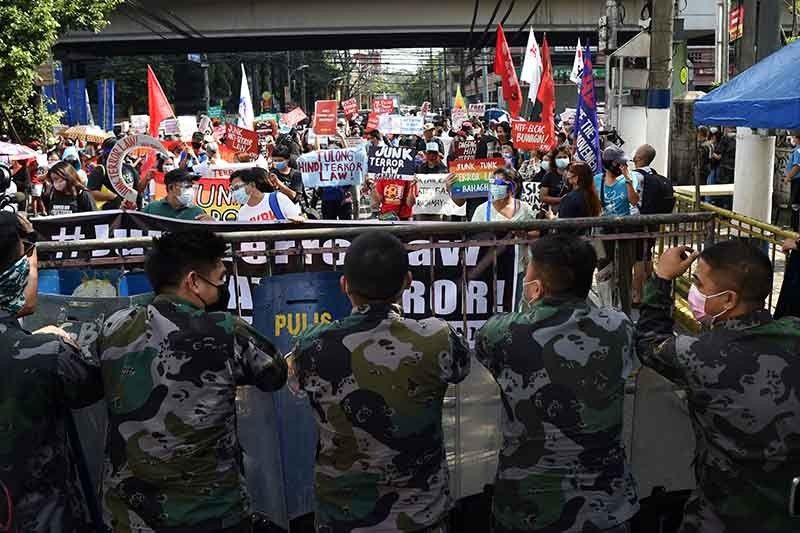Anti-Terrorism Act diminishes power of Judiciary, petitioners say

MANILA, Philippines — Does the widely opposed Anti-Terrorism Act of 2020 relegate judges to being rubber stamps for orders from the executive branch?
On the first day of oral arguments on the anti-terrorism law, petitioners assailed Sections 29 and 34 of Republic Act 11479.
Section 29 allows the detention of a suspected terrorist for up to 24 days without judicial charge, while Section 34 states that when a person charged has been granted bail as evidence is not strong, the prosecutor can ask the court to limit that person's movements within a municipality or city.
Petitioners have argued that the power to order a person's detention lies with the Judiciary, and not with the Anti-Terrorism Council, a panel composed of officials from the executive branch.
FOLLOW: LIVE: Oral arguments on petitions vs the anti-terrorism law
'Political question'
Senior Associate Justice Estela-Perlas Bernabe pressed petitioners on whether Section 34 of the law, which restricts the movement of a person who has been charged but is freed on bail, is a “policy matter that should be left to the wisdom of legislature.”
UP Constitutional Law professor John Molo replied that this may fall into the doctrine of political questions.
In the 1957 case of Tañada vs Cuenco, the SC said “political question” is frequently used to refer to questions beyond judicial questions, “which under the constitution are to be decided by the people in their sovereign capacity, or in regard to which full discretionary authority has been relegated to the legislative or executive branch of the government.”
The court, in a 2019 ruling in Kilusang Mayo Uno vs Aquino, said the development of the courts’ judicial power arose from the use and abuse of the political question doctrine during the Martial Law years under Ferdinand Marcos.
Molo cited the US case of Baker vs Carr where he said “the preliminary requisites are there must be a constitutional commitment as found in the matter has been committed to another branch of government.” As example, Molo cited impeachment proceedings, a matter under the discretion of Congress.
But Molo said that the political question doctrine does not apply to the anti-terrorism law, because, he said, in Section 29, “the textual commitment is to the judges, to the judiciary, warrants must be determined by the judge, so the reverse actually applies.”
He added: “We have judicial standards your honor. They are the Bill of Rights, and the entire body of jurisprudence enacting the Bill of Rights, they are judicial and they have already been discovered over decades.”
On limiting the movement of people charged but out on bail
Section 34 of the law discusses the restriction on the right to travel. It reads in part that in cases when evidence of guilt is not strong and a person charged is granted bail, “the court, upon application by the prosecutor, shall limit the right of travel of the accused to within the municipality or city where he/she resides or where the case is pending.”
Senior Associate Justice Bernabe pointed out that the Constitution permits impairment of travel in the interest of national security and public health. “Isn’t terrorism a national security or public safety matter that may be considered by Congress to restrict the right to travel?”
Molo noted that while terrorism may be subject of legislation to limit a constitutional right such as the right to travel, the restriction must still comply with the Bill of Rights.
Zeroing in on the wording of the law, Molo argued that the Anti-Terrorism Act states that the judge shall limit the movement of a person upon mere application of the prosecutor. “How can that happen if the evidence of guilt is not already strong?”
“That is why, your honor, we also raise it as part of the grounds that this law turns judges into rubber stamps because of the phraseology of the law therefore it is diminishing the Judiciary,” Molo added.
On warrantless arrest
Even before the anti-terrorism law was enacted, lawyers’ groups assailed Section 29, pointing out that even during an extraordinary time when martial law has been declared, authorities should bring an arrested person to a judicial authority within three days.
Section 29 specifically states that law enforcers or military personnel with written authorization of the Anti-Terrorism Council can take custody of a suspected terrorist for up to 14 days, and extend it by another ten days.
Rep. Edcel Lagman (Albay), among the lawyers tasked with appearing at the debates, pointed out that the Constitution holds that “a warrant of arrest shall issue only upon probable cause, determined personally by the judge.”
Responding to questions from Bernabe, Lagman continued: “In other words, any warrant issued by the executive agency cannot be consistent with the Constitution… The Section 29 of the ATA has no saving grave whatsoever because it directly violates the Constitution.”
Lawyer Evalyn Ursua, responding to questions from Associate Justice Rosmari Carandang, also said a designated terrorist may be arrested, prosecuted and have their assets frozen.
Ursua asserted that these powers should be considered as judicial function, “because it involves interpretation of the law and involves adjudication of rights.”
Carandang pressed: How about the power of a prosecutor, an official under the executive branch?
Ursua pointed out that a prosecutor only makes a finding of probable cause for the purpose of filing Information or charges before a court. “A prosecutor cannot arrest, cannot detain, cannot authorize freezing of assets,” she added.
The oral arguments on the anti-terrorism law petitions will resume on February 9.
- Latest
- Trending




























